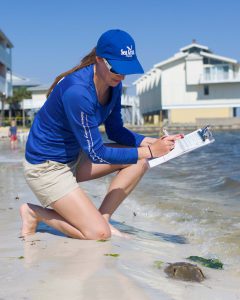Horseshoe crabs are a vital part of Florida’s coastal ecology. Local scientists are working with community members to gather information about the species on Miami Dade County’s beaches.

Want to help? Mark your calendars for February 5 and register for a Florida Horseshoe Crab Watch training workshop. From 9 a.m. to noon, participants will meet at Crandon Park North Beach, located at 6767 Crandon Boulevard in Key Biscayne. There, participants will learn horseshoe crab identification, biology, surveying and tagging techniques. Volunteers must be 16 and older to participate. Registration is required for the training and is available from this link https://bit.ly/3CnDSc6.
The event is the third hands-on training and call for volunteers since 2022, when residents of Miami-Dade joined the Florida Horseshoe Crab Watch, a statewide citizen science initiative which began in 2015.
“We are very excited to continue this program in Miami-Dade County,” said Ana Zangroniz, Florida Sea Grant agent for UF/IFAS Extension Miami-Dade County. “Aside from a handful of citizen observer reports, we lack data and monitoring for horseshoe crabs in the county. Continuing the program here gives us the opportunity to continue building that dataset.”
The volunteer-based citizen science program was founded as a partnership by the University of Florida Institute of Food and Agricultural Sciences (UF/IFAS), UF/IFAS Extension, Florida Sea Grant, and the Florida Fish and Wildlife Conservation Commission. It was created to increase knowledge about the horseshoe crab population in Florida.
The program started in Cedar Key at the UF/IFAS Nature Coast Biological Station and has grown into the statewide initiative.
The program takes advantage of the fact that horseshoe crabs come ashore this time of year. Volunteers walk a known section of beach at predetermined times and count the number of horseshoe crab mating groups observed. Surveys will take place during the daytime peak high tides during the months of February, March and April.
Small subsets of crabs are collected, measured, tagged with a small, numbered disc, and released back into the wild. Reports of tagged horseshoe crabs help track crab movements and reappearances on beaches.
For more information, contact Zangroniz at azangroniz@ufl.edu, or 305-421-4017.
Para acceder a esta comunicación en español, por favor utilice este enlace
ABOUT UF/IFAS
The mission of the University of Florida Institute of Food and Agricultural Sciences (UF/IFAS) is to develop knowledge relevant to agricultural, human and natural resources and to make that knowledge available to sustain and enhance the quality of human life. With more than a dozen research facilities, 67 county Extension offices, and award-winning students and faculty in the UF College of Agricultural and Life Sciences, UF/IFAS brings science-based solutions to the state’s agricultural and natural resources industries, and all Florida residents.
The Florida Sea Grant program, hosted at UF/IFAS, is a university-based program that supports research, education and Extension to conserve coastal resources and enhance economic opportunities for the people of Florida. In addition to UF/IFAS, the program is a partnership between Florida universities, the National Oceanic and Atmospheric Administration and county governments.
flseagrant.org | @FloridaSeaGrant
 1
1
